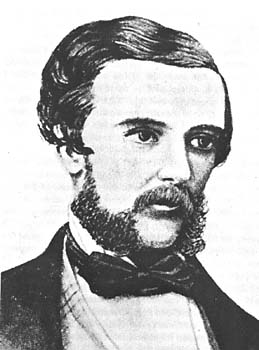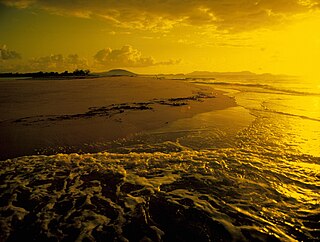| Weymouth Bay Queensland | |
|---|---|
| Coordinates | 12°29′56″S143°20′28″E / 12.4988°S 143.3411°E |
| Location |
|
| Region | Far North Queensland |
Weymouth Bay is a bay in North Queensland, Australia. [1]
| Weymouth Bay Queensland | |
|---|---|
| Coordinates | 12°29′56″S143°20′28″E / 12.4988°S 143.3411°E |
| Location |
|
| Region | Far North Queensland |
Weymouth Bay is a bay in North Queensland, Australia. [1]
The bay opens onto the Coral Sea, part of the South Pacific Ocean. The Pascoe River flows into the bay. To the south of the bay is the Kutini-Payamu National Park. [2]

It was one of the Australian places named by James Cook during his voyage in HMS Endeavour northwards along the east coast in 1770; he named it on Friday 17 August 1770. [3]
Weymouth Bay was significant in the exploration of the Cape York Peninsula by Edmund Kennedy in 1848. During their journey north from Rockingham Bay (near the present-day town of Cardwell), Kennedy left eight members of the expedition at Weymouth Bay, intending to pick them up later on the return by sea. However Kennedy and all but one member died later during the journey; all but two of the eight members left at Weymouth Bay died before they were relieved. [4]

Captain James Cook was a British explorer, cartographer and naval officer famous for his three voyages between 1768 and 1779 in the Pacific Ocean and to New Zealand and Australia in particular. He made detailed maps of Newfoundland prior to making three voyages to the Pacific, during which he achieved the first recorded European contact with the eastern coastline of Australia and the Hawaiian Islands and the first recorded circumnavigation of New Zealand.

HMS Endeavour was a British Royal Navy research vessel that Lieutenant James Cook commanded to Tahiti, New Zealand and Australia on his first voyage of discovery from 1768 to 1771.

Mission Beach is a coastal town and locality in the Cassowary Coast Region, Queensland, Australia. In the 2021 census, the locality of Mission Beach had a population of 1,014 people.

Edmund Besley Court Kennedy J. P. was an explorer in Australia in the mid nineteenth century. He was the Assistant-Surveyor of New South Wales, working with Sir Thomas Mitchell. Kennedy explored the interior of Queensland and northern New South Wales, including the Thomson River, the Barcoo River, Cooper Creek, and Cape York Peninsula. He died in December 1848 after being speared by Aboriginal Australians in far north Queensland near Cape York.

Botany Bay is an open oceanic embayment, located in Sydney, New South Wales, Australia, 13 km (8 mi) south of the Sydney central business district. Its source is the confluence of the Georges River at Taren Point and San Souci as well as the Cooks River at Kyeemagh, which flows 10 km (6 mi) to the east before meeting its mouth at the Tasman Sea, midpoint between the suburbs of La Perouse and Kurnell. The northern headland of the entrance to the bay from the Tasman Sea is Cape Banks, and, on the southern side, the outer headland is Cape Solander, and the inner headland is Sutherland Point.

Point Danger is a headland, located at Coolangatta on the southern end of the Gold Coast on the east coast of Australia. Separated by Snapper Rocks and Rainbow Bay to the west, with Duranbah Beach and the Tweed River mouth to the south, present-day Point Danger has also indicated the border between New South Wales and Queensland, Australia, since 1863.
The Northumberland Islands are a scattered island chain off the eastern coast of Queensland, Australia.

Lockhart River is a town in the Aboriginal Shire of Lockhart River and a coastal locality split between the Aboriginal Shire of Lockhart River and the Shire of Cook, on the Cape York Peninsula in Queensland, Australia. The town is an Aboriginal community. From 1924 to 1967, the Lockhart River Mission was run by the Anglican Church. In the 2021 census, the locality of Lockhart River had a population of 640 people.

The first voyage of James Cook was a combined Royal Navy and Royal Society expedition to the south Pacific Ocean aboard HMS Endeavour, from 1768 to 1771. It was the first of three Pacific voyages of which James Cook was the commander. The aims of this first expedition were to observe the 1769 transit of Venus across the Sun, and to seek evidence of the postulated Terra Australis Incognita or "undiscovered southern land".
Cape Grafton is a cape located to the north-east of Cairns in Queensland, Australia. The cape was named by Lieutenant James Cook during his first voyage of discovery in 1770. It was named after Augustus FitzRoy, 3rd Duke of Grafton, the British prime minister when Cook sailed. Cook set anchor two miles from the shore and briefly inspected the cape with botanists Joseph Banks and Daniel Solander.

Cooktown is a coastal town and locality in the Shire of Cook, Queensland, Australia. Cooktown is at the mouth of the Endeavour River, on Cape York Peninsula in Far North Queensland where James Cook beached his ship, the Endeavour, for repairs in 1770. Both the town and Mount Cook which rises up behind the town were named after James Cook.

Jackey Jackey, Aboriginal name Galmahra, was the Aboriginal Australian guide and companion to surveyor Edmund Kennedy. He survived Kennedy's fatal 1848 expedition into Cape York Peninsula and was subsequently formally recognized for heroic deeds by the Colony of New South Wales in words engraved on a solid silver breastplate or gorget, which read as follows:
Presented by His Excellency Sir Charles Augustus FitzRoy K.D. Governor of New South Wales, to Jackey Jackey, an Aboriginal native of that colony. In testimony of the fidelity with which he followed the late Assistant Surveyor E.B.C. Kennedy, throughout the exploration of York Peninsula in the year 1848; the noble daring with which he supported that lamented gentleman, when mortally wounded by the Natives of Escape River, the courage with which after having affectionately tended the last moments of his Master, he made his way through hostile Tribes and an unknown Country, to Cape York; and finally the unexampled sagacity with which he conducted the succour that there awaited the Expedition to the rescue of the other survivors of it, who had been left at Shelbourne Bay.
Turkey Beach is a coastal town and locality in the Gladstone Region, Queensland, Australia. In the 2021 census, the locality of Turkey Beach had a population of 148 people.

Sandy Cape is the most northern point on Fraser Island off the coast of Queensland, Australia. The place was named Sandy Cape for its appearance by James Cook during his 1770 voyage up the eastern coast of Australia aboard the Endeavour.

Rockingham Bay is a bay in Far North Queensland, Australia.

Iron Range is a coastal locality in the Shire of Cook, Queensland, Australia. The town of Portland Road is on a north-east headland in the locality. In the 2021 census, Iron Range had a population of 30 people.

The European exploration of Australia first began in February 1606, when Dutch navigator Willem Janszoon landed in Cape York Peninsula and on October that year when Spanish explorer Luís Vaz de Torres sailed through, and navigated, Torres Strait islands. Twenty-nine other Dutch navigators explored the western and southern coasts in the 17th century, and dubbed the continent New Holland. Most of the explorers of this period concluded that the apparent lack of water and fertile soil made the region unsuitable for colonisation.

South Mission Beach is a coastal town and locality in the Cassowary Coast Region, Queensland, Australia. In the 2021 census, the locality of South Mission Beach had a population of 968 people.

Tully Heads is a coastal town and locality in the Cassowary Coast Region, Queensland, Australia. In the 2021 census, the locality of Tully Heads had a population of 354 people.